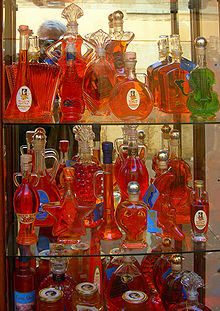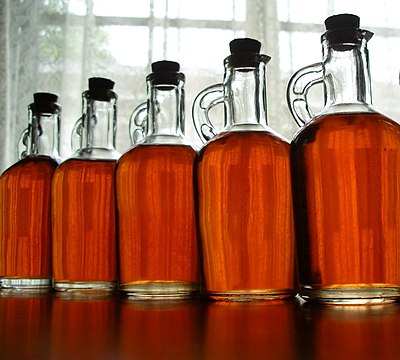Liqueur: Difference between revisions
rrv vandalism |
No edit summary |
||
| Line 2: | Line 2: | ||
[[File:KoumQuatLiqueur.jpg|thumb|[[Kumquat]] liqueurs from [[Corfu]]]] |
[[File:KoumQuatLiqueur.jpg|thumb|[[Kumquat]] liqueurs from [[Corfu]]]] |
||
A '''liqueur''' ({{IPAc-en|icon|l|ɪ|ˈ|k|j|ʊ|ər}}) is an [[alcoholic beverage]] that has been flavored with [[fruit]], [[herb]]s, [[Nut (fruit)|nuts]], [[spice]]s, [[flower]]s, or [[cream]] and bottled with added sugar. Liqueurs |
A '''liqueur''' ({{IPAc-en|icon|l|ɪ|ˈ|k|j|ʊ|ər}}) is an [[alcoholic beverage]] that has been flavored with [[fruit]], [[herb]]s, [[Nut (fruit)|nuts]], [[spice]]s, [[flower]]s, or [[cream]] and bottled with added sugar. Liqueurs are usually not aged for long but may have resting periods during their production to allow flavors to marry. |
||
The distinction between liqueurs and [[Distilled beverage|spirits]] is not simple because many spirits are available today in a flavored form (e.g., [[Vodka infusion|flavored vodka]]). The most reliable guide to classification is that liqueurs contain added sugar, but spirits do not. |
The distinction between liqueurs and [[Distilled beverage|spirits]] is not simple because many spirits are available today in a flavored form (e.g., [[Vodka infusion|flavored vodka]]). The most reliable guide to classification is that liqueurs contain added sugar, but spirits do not. |
||
Revision as of 06:03, 28 December 2011

A liqueur (/[invalid input: 'icon']lɪˈkjʊər/) is an alcoholic beverage that has been flavored with fruit, herbs, nuts, spices, flowers, or cream and bottled with added sugar. Liqueurs are usually not aged for long but may have resting periods during their production to allow flavors to marry.
The distinction between liqueurs and spirits is not simple because many spirits are available today in a flavored form (e.g., flavored vodka). The most reliable guide to classification is that liqueurs contain added sugar, but spirits do not.
Some people distinguish between liqueurs and cordials, but the words have become synonymous.[1][2][3]
Dessert wines may taste like a liqueur but they do not contain any added flavoring or sugar.
Most liqueurs have a lower alcohol content (15%-30% ABV) than spirits, but some liqueurs contain as much as 55% ABV.
History
Liqueurs are historical descendants of herbal medicines; they were made in Italy as early as the 13th century and were often prepared by monks (e.g., Chartreuse and Bénédictine).
Nowadays, liqueurs are made worldwide and are served in many ways: by themselves, poured over ice, with coffee, mixed with cream or other mixers to create cocktails, etc. They are often served with or after a dessert. Liqueurs are also used in cooking.
Some liqueurs are prepared by infusing certain woods, fruits, or flowers, in either water or alcohol, and adding sugar or other items. Others are distilled from aromatic or flavoring agents. Anise liqueurs have the interesting property of turning from transparent to cloudy when added to water: the oil of anise remains in solution in the presence of a high concentration of alcohol, but crystallizes when the alcohol concentration is reduced; this is known as the ouzo effect.
Layered drinks are made by floating different-coloured liqueurs in separate layers. Each liqueur is poured slowly into a glass over the back of a spoon or down a glass rod, so that the liquids of different densities remain unmixed, creating a striped effect.
The word liqueur comes from the Latin liquifacere ("to liquefy").

See also

References
- ^ Lichine, Alexis (1987). Alexis Lichine's New Encyclopedia of Wines & Spirits (5th ed.). New York: Alfred A. Knopf. p. 198. ISBN 0394562623.
{{cite book}}: Cite has empty unknown parameter:|coauthors=(help) - ^ New Oxford American Dictionary (3rd ed.). New York: Oxford University Press. 2010. p. 385. ISBN 978-0-19-539288-3.
{{cite book}}: Cite has empty unknown parameter:|coauthors=(help) cordial: "another term for liqueur" - ^ "The Cook's Thesaurus". Retrieved October 11, 2010.
External links
